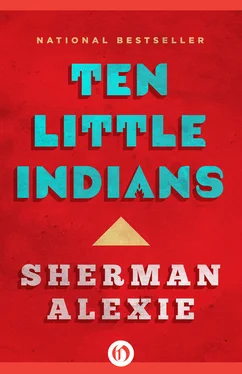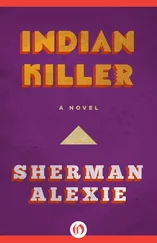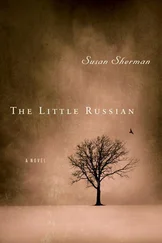“Here at St. Therese, my dad volunteered for the youth programs, and he was one of the most dependable readers and Eucharistic ministers. He read the gospels with more passion and pride than the Jesuits. Ay, jokes. Sorry about that, Father Terry, but you know it’s true. Ay, jokes.
“My dad, Harry, he was fond of telling people how he would’ve become a priest if he hadn’t loved the ladies so much. And there were always a few ladies who would have loved him back, and you know who you are. You’re the ones crying the most. Ay, jokes. But of course my loyal dad has been chaste since his wife, my mother, Helen, died of brain cancer twenty-one years ago. So maybe my dad was like a Jesuit, except he didn’t have sex, unlike most of the Jesuits. Ay, jokes.
“My mom died only three days after I graduated from high school. It was a terrible, ugly death. And my dad was never really happy again and never looked to be loved again by another woman, but he stayed active like a shark: Don’t stop moving or you die. Ha, he was the Great Red Whale, my dad. Ay, jokes. Maybe my dad and I were the Great Red Whale together. We were always together. I’ve lived in the same house with him all of my life. I guess, in some real way, my father became my mother. Harrison was Helen. He adopted some of her mannerisms, you know, like he scratches his head whenever he’s frustrated, just like she does.
“Listen to me. I keep talking about them in the present tense. And then I talk about them in the past tense. And I was never any good at English grammar anyway. So you can blame my high school English teacher for that. Sorry about that, Ms. Balum. Ay, jokes.
“After he got old, my dad was the crossing guard at Thirty-fourth and Union and knew the names of all of his kids. Since they were all Catholic kids, they only had twelve names. Or maybe eleven, since nobody has named their kid Judas since Judas was named Judas by his folks. Ay, jokes.
“My old man was strong for an old man, you know, and he could still hit ten or twelve of those long-range set shots in a row. Basketball was always my dad’s passion. He was Idaho State High School Basketball Player of the Year in 1952. He loved the Lakers when they played in Minneapolis, and he loved them more after they moved to Los Angeles. Elgin Baylor. Gail Goodrich. Jerry West. Wilt Chamberlain. Happy Hairston. Those guys won thirty-three in a row in 1973.
“After my mother died, my dad and I watched thousands of basketball games on television and in person. Sometimes, on cold Saturday nights, he and I would drive for hours to watch small-town high school teams, not because we knew any of the players but because they were playing a small-town version of basketball, and it was ragged and beautiful and passionate and clumsy and perfect. Davenport Gorillas. Darrington Loggers. Selkirk Rangers. Neah Bay Red Devils. Toutle Lake Fighting Ducks.
“And now my father is gone, and my mother is gone, and they’re gone together, and I’m a thirty-nine-year-old orphan. I didn’t even say good-bye to my father before I left the house on the day he died. I never really said good-bye to my mother before she died. I will have to live the rest of my life with a failed son’s regrets. I don’t even know what I’m going to do now.”
As he drove off Mount Rainier and through the park, Frank knew his eulogy was inadequate, incomplete, and improvisational. He knew he would have to sit and write a real eulogy. He would fill a dozen notebooks with draft after draft. Every word would perfectly capture how much love and pain he felt for his father and mother. Harrison and Helen Snake Church deserved poetry, not the opening monologue of an indigenous talk show. Mr. Death, Frank thought, you are a funnyman, but I will not laugh. Frank sped out of the park. Ignoring the risk of speeding tickets, he drove west on two-lane highways, north on Interstate 5 through Tacoma into Seattle, east off the James Street exit, and ran red lights twenty blocks into the Central District, where he and Harrison lived on Thirty-seventh Avenue. Frank drove his government truck onto the front lawn, leaped out and raced up the front steps, struggled with the front door, threw it open, rushed into the kitchen, and saw his father sitting at the table. Harrison was drinking coffee and eating Grape-Nuts. He ate breakfast for every meal.
“You’re alive,” said Frank, completely surprised by the fact.
“Yes, I am,” Harrison said as he studied his bloody, panicked son. “But you look half dead.”
“I had a vision,” Frank said.
Harrison sipped his coffee.
“I saw you in my head,” Frank said. “You’re supposed to be dead. I saw you dead.”
“You have blurry vision,” said Harrison.
One year and four days later, Harrison died of a heart attack in the QFC supermarket on Broadway and Pike. When he heard the news, Frank wondered if his previous year’s vision had been accurate, if he’d foreseen his father’s death. But there must be a statute of limitations for visions, Frank thought, there must be an expiration date for ESP. Beyond all that, Frank didn’t believe anyone could predict the future. His supposedly psychic vision of his father’s death bore some general resemblance to his real death, but the details were different. Harrison was shopping in the produce department when he coughed once, rubbed his tingling left arm, and died. “Probably dead before he hit the floor,” the coroner had said. When Harrison fell, he knocked over an artfully arranged display of bananas, which was appropriate and funny, since Harrison had always hated the taste of what he called “the devil’s evil yellow penis.” Frank buried his father beside his mother’s grave in the same Seattle graveyard where Bruce and Brandon Lee were also buried. So, hey, Frank figured his father was lying with damn good company, and if there was an afterlife, then Harrison was probably learning jeet kune do and making love to his wife, Helen, for all of eternity.
At his father’s graveside, overlooking Lake Washington, Frank stood to give the eulogy he’d carefully written but found he couldn’t read the words on the page. Grief turned him into an illiterate. He tried to remember what he’d written so he could recite his eulogy by memory, but he discovered he couldn’t speak at all. Grief turned him into a mute. Finally, after five minutes of silence, as the assembled mourners shook with collective embarrassment, Frank finally remembered how to say four words: “I love my father.”
Afterward, Frank shook the hands and accepted the hugs of dozens of his father’s friends and family. He couldn’t remember any of their names. Grief turned him into a stranger in his own tribe. Finally, Frank recognized an older woman, his mother’s aunt Margaret Marie, who kissed him hard on the lips. She tasted like salt.
“Your father was a ballplayer,” she said. “He could have played in college, you know? You should have said something about that.”
Frank laughed. What kind of person offered constructive criticism at a funeral? What kind of literate mourner had the nerve to deconstruct a eulogy?
Harrison had been a very good basketball player, but he’d never been good enough to play college hoops, not even at the community-college level. He’d been a great shooter but was never much of an athlete — too short and slow and tentative — but Frank, a genetic freak at six feet six (making him the seventeenth tallest Spokane Indian in tribal history), had always been a truly supernatural baller, the kind of jumper and runner who ignored physics when he played. He’d averaged forty-one points a game during his senior year at Seattle’s Garfield High School and had received 114 scholarship offers from colleges all over the country. He’d signed a letter of intent with the University of Washington and had planned to major in environmental science. But then his mother died. To honor her and keep her memory sacred, Frank knew he had to give up something valuable. He had to bury with her one of his most important treasures. So he buried his basketball dreams. On the morning of her funeral, Frank walked to the local park and shot one hundred jump shots and made eighty-five of them. He left the ball at the park, helped bury his mother that afternoon, and had not played the game since. For the first few years, Frank had almost died whenever he thought about basketball, but the acute pain turned chronic, and then it was a dull and distant ache, and then it was the phantom itch of an amputated limb, and then it was gone.
Читать дальше












